The Retina-Heart Connection: How Cardiovascular Health Affects Your Vision

When people think about heart health, they don’t usually think about their eyes. But the truth is, the two are more connected than you might think. When your cardiovascular system is under strain, it often leaves a visible footprint in the eye.
At Retina Group of Florida, we routinely see how conditions like high blood pressure, diabetes, and arterial stiffness can impact retinal health. These changes may develop silently and without obvious symptoms, but over time, they can lead to serious vision complications. Understanding this connection is key to protecting both your sight and your overall well-being.
What Your Retina Says About Your Heart
The retina is the light-sensitive tissue at the back of your eye, and it's nourished by a network of tiny blood vessels. These vessels are so small and delicate that even slight changes in blood pressure or blood flow can affect them. In fact, research shows that rising blood pressure and stiffening arteries—two common warning signs of cardiovascular disease—can trigger noticeable changes in the retina's blood vessels.
These changes are often invisible to patients but can be detected during a comprehensive retinal exam. In some cases, subtle shifts in vessel shape, size, or integrity may appear long before you feel symptoms elsewhere in your body. That makes regular retinal screenings an essential tool in identifying underlying health concerns early.
Retinal Conditions Linked to Cardiovascular Health
Over time, cardiovascular risk factors such as high blood pressure, elevated blood sugar, and cholesterol buildup can all interfere with the retina’s ability to function properly, leading to sudden vision changes or long-term damage. Below are some of the most common retinal conditions linked to cardiovascular health:
- Hypertensive Retinopathy: Chronic high blood pressure can damage the walls of your retinal arteries, causing them to narrow or even leak. Over time, this condition can lead to blurred vision, swelling in the macula, or bleeding inside the eye.
- Diabetic Retinopathy: Diabetes is a well-known contributor to both heart disease and vision loss. Persistently high blood sugar weakens the blood vessels in the retina, leading to fluid leakage, swelling, and the growth of abnormal new vessels. Diabetic retinopathy progresses gradually and often has no symptoms in its early stages, making regular screenings especially important for people with diabetes. If left untreated, the condition can lead to blurriness, distortion, or even permanent vision loss.
- Retinal Artery and Vein Occlusions: These conditions occur when a small artery or vein in the retina becomes blocked—usually by a clot or cholesterol deposit. A central retinal artery occlusion (CRAO) is sometimes called an “eye stroke” and can cause sudden, severe vision loss. A retinal vein occlusion affects blood drainage from the eye and may result in blurred or distorted vision, especially if the macula is involved. While there is no cure, prompt treatment with options like anti-VEGF injections or laser therapy can sometimes preserve or improve remaining vision and reduce the risk of further damage.
Why Routine Retina Exams Matter
One of the biggest misconceptions about eye health is that you only need an exam if your vision changes. But many retinal diseases are silent at first, often developing with little or no warning. By the time symptoms appear, the damage may already be advanced.
That’s why we recommend regular retinal exams for anyone with risk factors such as:
- High blood pressure
- Diabetes
- High cholesterol
- Smoking history
- Family history of heart disease
These exams can detect early signs of retinal damage, monitor changes over time, and guide treatment plans to protect both your vision and your overall health.
Protecting Your Vision Starts With Prevention
If you’ve been diagnosed with a cardiovascular condition—or if you’re managing risk factors like high blood pressure or diabetes—it’s essential to include your eye health in the conversation. Annual eye exams can catch subtle retinal changes that may indicate worsening vascular health. And when conditions like diabetic retinopathy or retinal vein occlusion are caught early, treatment is more likely to succeed.
At Retina Group of Florida, our team of retina specialists is here to help you stay ahead of these conditions with expert care and advanced imaging tools. Don’t wait for vision changes to get your eyes checked. Prioritize your retina health today and schedule your comprehensive retinal exam with Retina Group of Florida. Your vision—and your health—are worth it.

